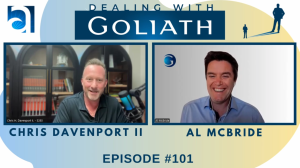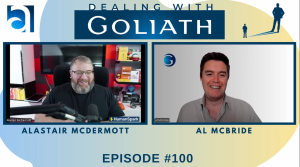Show Notes:
How a German Field Marshal’s 4 types of soldier sparked thoughts on focus, taking time to reflect and the meaning of a word being closer to Homer Simpson or getting more done.
We go from $10,000 per hour thinking onto the approach of Abraham Lincoln in cutting down a tree and focusing on the precious few.
-
Von Manstein’s 4 types of soldier and what they’re good for
-
The danger of hard working futility and the effect on others around them
-
Von Moltke’s version, the dumb and energetic make things happen, the wrong things
-
Lazy is such a loaded word
-
Is it Homer Simpson or is it focus?
-
Take time to reflect
-
$10,000 per hour thinking of Perry Marshall
-
What Abraham Lincoln said about trees, preparation and axes
-
A blunt vs a sharp axe, the force multiplier for greater leverage
-
Compound interest on effort
-
Be mindful of your zoom
-
The 80/20, focusing on the precious few
Transcript
Al McBride 0:02
Welcome to the dealing with Goliath podcast. This is a solo espresso episode that I call Smart and Lazy to Sharpen the Axe. So I was having a conversation of sorts with a mentor of mine there a few weeks ago. And he told the story of Field Marshal Erich Von Manstein.
Al McBride 0:42
Von Manstein is a fascinating character. He was a Field Marshal, a soldier in the First World War, was a Field Marshal in the Second World War. And he was famous for disobeying Hitler a lot until he was dismissed out on the Russian front because he wouldn’t fight to the last man.
Al McBride 1:03
He wanted to save his man and all that sort of stuff. And I was just looking him up here before I hit record, I was reading up about him, because he knew a bit about him, but not a lot, fascinating character. He, he was on trial, after the war, like a lot of the senior people in the German army and German system were after the Second World War.
Al McBride 1:30
He went to prison for a few years, I think was for not treating prisoners of war particularly well. But he was a big proponent, he wrote a book that was a big proponent of this idea of the the clean Wehrmacht the clean German Army.
Al McBride 1:44
So his perspective was there a lot of professional soldiers who are just being soldiers, and loads of the nasty stuff wasn’t done by them or endorsed by them. I don’t know how much how accurate that is. But it was a point of view. What was fascinating was, was they actually ended his career would you believe, as a senior advisor to the Germans, the West German state, and particularly in relation to NATO.
Al McBride 2:12
What a trajectory of a life, you know, for better or worse, but it’s just fascinating stuff. But anyway, this was mentioned to me, von Manstein was mentioned in particular reference to a famous thing he said about four types of soldier.
Al McBride 2:28
Those are the four types of soldier and he can nearly insert, you know, office staff these days, I think with this one, but he said the first, they are the lazy, stupid ones. Instead, leave them alone, they do no harm. They just keep things ticking over. They’re not terrible. They’re not great. There’s a place for them, often with a lot of menial tasks.
Al McBride 2:55
That was his kind of perspective, charming. Second, there were the hard working intelligent ones. He said they make excellent staff officers, and they ensure that every detail is properly considered. So hard working intelligent ones, they’re great to have around for obvious reasons.
Al McBride 3:15
The third are the hard working stupid ones and these people are a menace, and they must be fired at once he said they create irrelevant work for everybody. Think about that. How often have we had people do seem to be doing work for the sake of doing work that has no particular purpose.
Al McBride 3:33
In fact, it’s kind of anti progress, anti purpose, for daft reasons they create bad Will you know, it’s kind of an interesting one. But he said Finally, there are the intelligence lazy ones, and they’re suited for the highest office. He said, they’re the people that you want to promote to the highest level.
Al McBride 3:55
Now, when I was looking this up, I discovered a few things, like almost every every quote, when I have to look it up. Generally, it came from someone that they knew when they were growing up. This seemingly came from General von Moltke if there’s a Prussian army officer and much revered, and his language is slightly different, which was interesting.
Al McBride 4:19
He said, the dumb and energetic said they make things happen, but the wrong things. That’s exactly why you need to get rid of them. So it’s that same idea. But this really stuck with me, though, when, as I said, this mentor of mine mentioned this that the optimum was smart and lazy. And I think people take that a little bit too literally.
Al McBride 4:44
I was reading blog posts about this from management consultants and all sorts of people are like, not anymore. It’s all the it’s all the energetic and smart people. They’re the ones that get ahead.
Al McBride 4:55
I think they’re taking a little bit too literally because my reading on it First of all, as I said is that the smarter lazy certainly has a place even still in these days. Smart and lazy, lazy, such a loaded word. It’s such an emotional or such a word we jump to our own meanings of because lazy, it brings me up the idea of Homer Simpson, you know, sitting in his hammock drinking beer snoozing of a Saturday afternoon when he should be cutting the lawn right?
Al McBride 5:29
Or, you know, sitting in front of the TV, stuffing his face with chips or whatever. That’s the word that lazy it’s a meaning it brings up. But when you think about it, maybe that’s not the intended meaning. A lot of people said, Yeah, you know, Von moltke or Manstein had a point.
Al McBride 5:53
For me, it’s about this idea moreso of focus. This idea of taking a moment to step back, not just creating work for the sake of work. This has happened to me the last few weeks, where I find myself, just grinding through things because they’re there to grind through.
Al McBride 6:13
Rather than doing what I tell, or request clients do is carve out that half an hour a week, initially, and then 90 minutes. And as Perry Marshall does, one of the great consultants, he gets an awful lot of his clients and people to carve out whole days. To do this, what do you call CEO thinking, you know, we put on that different hat.
Al McBride 6:36
Whereas he said, it’s where you get your $10,000 an hour ideas. So sometimes to outsource or $10 an hour, some are 50, some are 100 or 500, then sometimes when you think of a whole new way of doing things, a whole new product line or some insight that will save you a fortune, or make you a fortune, they’re literally $10,000 an hour ideas.
Al McBride 7:00
You can’t get those ideas, usually unless you have that time to to zoom out to see the bigger picture. And yet, I think it’s the same with a lot of coaches, a lot of people working in training or, or therapy is that listening to your own advice is sometimes very difficult, you know?
Al McBride 7:20
It’s carving out that time, that little time slot to reflect what’s working, what’s not? Are my actions actually getting me closer to where I want to go? Are they still effective? Or do I have to correct course, do I have to choose something better. And taking that time to reflect i think is hugely valuable.
Al McBride 7:43
It’s a little bit like what Abraham Lincoln said, he said, Give me six hours to chop down a tree and I’d spend the first four hours sharpening the axe and this idea of sharpening that axe, making sure you’re having the most effective use of your energy and of your time and resources.
Al McBride 8:05
It’s very interesting point. So for me, the so called lazy approach is about sharpening the axe, not just hitting it with a blunt axe, how long would it take you to cut down a tree with a blunt axe compared to a sharp one? So this idea of the force multiplier of gaining leverage.
Al McBride 8:27
That force multiplier, how do you how do you compound your efforts to have far greater effect? So one way is to sharpen the axe to continue the analogy, can you get a chain saw right? Or I suppose the ultimate one is working out a way where you don’t even need to chop down the tree at all.
Al McBride 8:50
I like trees, I don’t want to chop down a tree. They’re great yokes, they give oxygen you know, keep the they’re the lungs of the planet. Why the hell we want to chop them down. So anyway, the same point slight tangent there, but the same point where is the force multiplier?
Al McBride 9:05
How can I create compound interest on my efforts was not that the Einstein thing about one of the most mystic forces in the universe, compound interest? I think it’s mystical because people find it so boring that they move away from it. But it is this force multipliers and force multipliers, better marketing better copy right behind it from the off.
Al McBride 9:32
So it’s being able to step back and orientate to do what is most effective, but first, we need the time, that breath and zooming out. As I like to say, often I find you can get a new perspective on situations. I do this with clients a lot when you either zoom in, because you’re not looking in enough detail, but more often than I was the other way around.
Al McBride 9:55
As you’re too much into detail. You’re too much in the weeds, you’re too much working on just what’s in front of you, and you need to zoom out to take that big picture approach and see how all the details actually fit together.
Al McBride 10:09
I get that gestalt thinking that systemic approach what things work in accordance with how they affect. And then the feedback loop that comes back to the other elements in that system. It’s something I’ve started to become interested in is this is the system’s thinking.
Al McBride 10:27
So I’m going to do further episodes in the future around the 8020, which is all about focusing on the few things that matter on the ooda loop as it’s called, or it’s about how to orientate in the first place to find the things maybe that make the most difference.
Al McBride 10:48
I think this whole area, as I said, around force multipliers, there’s a wealth of insights and gems there. So I’m going to do a bit of reading to a bit of thinking and come back on that one.
Transcribed by https://otter.ai
Resources
- Wikipedia [Article]: Erich von Manstein
- Isambard [Article]: Von Manstein’s 4 Officer Types Adapted for Managers
- I Was Just Thinking Blog [Article]: Field Marshal Moltke’s Four Types of Military Officer
- Perry Marshall [Article]: Do You Wanna Make $10 Per Hour? Or $100, $1,000 or $10,000?
- Searchcio.Techtarget [Article]: OODA Loop Definition
- RainMakerVT [Article]: Give me six hours to chop down a tree, and I will spend the first four sharpening the axe
- Amazon [Book]: The Four Hour Work Week by Tim Ferriss
- Amazon [Book]: 80/20 Principle by Richard Koch
- Goliath Blog/Podcast: Flow: The 80/20 of Manager & Maker Time DWG #022 [80/20 principle, von Manstein, Focus etc]




This Post Has One Comment
Pingback: Flow: The 80/20 of Manager & Maker Time (Dealing with Goliath Podcast #022) - Alistair McBride
Comments are closed.